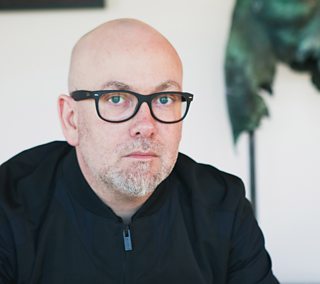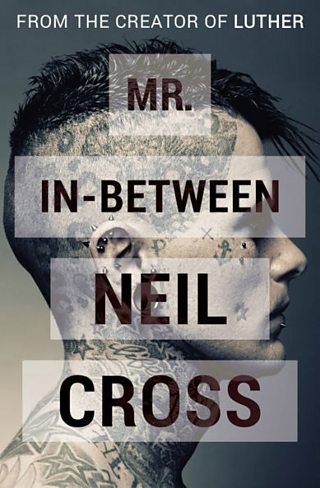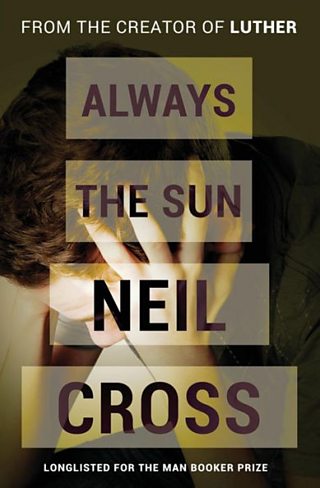To mark the launch of this year's on 26th June we spoke to novelist and screenwriter Neil Cross (the creator of 主播大秀 One's Luther) about his writing life.
Find out more about National Writing Day and how to get involved on the . Teaching Resources include

Neil Cross (photo credit: Peta Mazey)
Neil, you’ve said that you’ve been writing books since the age of seven – why do you think you had that need to tell stories and put them down on paper from such a young age?
Honestly, I’ve got no idea. And I’m scared to think about it too much in case it goes away.
For what it’s worth, I don’t think it originates in any trauma or childhood unhappiness. I think it’s just the way I was born: I keenly recall that before starting primary school I’d tell myself elaborate stories using plastic toy soldiers - and a bit later, Action Men with Realistic Hair and Gripping Hands.
I’d cry when my characters died. This was because their fates seemed entirely out of my control - they were in a story and somehow the story had taken over.
So in essence I’m still doing what I did when I was five years old, and probably for similar reasons. I just don’t know what the reason is.
Do you think it’s important for all young people to try writing their own stories?
I’m a bit sceptical about the idea that young people should be introduced to writing because in some abstract way it’s “good” for them - even though I think it is. I worry that, should educators even appear to be cramming a virtuous message down young peoples’ throats, those young people will come to resent the imposition.
Thing is: creative writing might be good for you, but that’s entirely secondary. What’s remarkable about it is the secret exhilaration of it. Which is to say: unlike many things which are good for you, it actually feels good. Creative writing is self-revelatory. It’s like setting off an explosion inside yourself. You’re not in control of it. No-one is.
It can be difficult to get going - the blank page and the winking cursor are notoriously off-putting. But once you’re up and running, something mysterious happens. Something inside you takes over, some deeper part of you unleashes a private, wild kind of freedom, an internal maker of connections.
That’s when the real benefit reveals itself: writing tells you things about yourself, things you didn’t know - things you didn’t know you didn’t know. It’s the best way to discover what you really think: what you like, what you fear, what you want from life, what you don’t.
In order to discover this strange joy, you needn’t concern yourself with what a story is “about”, or give a moment’s consideration to “theme” or “subtext”. (These things arise naturally from the very act of writing. At some point you can wander back over your story and seek them out, if you like.) You certainly don’t need to know how your story ends: how can you know how a story ends before you’ve told it to yourself?
The cliché has it that we should dance like nobody’s watching. I think people should be encouraged to write like nobody’s reading. Which means: they get to choose their subject, and no subject is off the table - not politics, not sex or love or hate. Not fear and resentment and yearning and loss and violence, or the fear of it. Not cancer or God or ghosts. Writers can populate their world with characters borrowed from real life, from their imagination or from books and films. (All writers are readers, and to some extent all fiction is fan fiction). They can write about an inconsequential conversation on a bus or about the heat death of the sun. It doesn’t matter.
What matters is, the choice is theirs. And so is their story. It doesn’t belong to you. If you’re expecting a young person to write in order to impress you, they’re going to write what they believe you expect of them. You’re asking them to dance while you look on.
Once they’re done, the writer should be free to share the result - if they choose. They should be permitted to keep their stories private, too, or to ceremoniously set them alight. What’s anathema to me is that, having encouraged people to discover the slightly feral and necessarily private joy of unfettered self-expression, we should then presume to sit in judgement on the results.
The results are not on the page. They’re inside the writer.

Neil Cross' first published novel 'Mr In-Between'
How did you move into becoming a published writer? What did it feel like to get your first book published?
Oh, that road was long and winding. I was expelled from school at fifteen. I believe they say “excluded” these days. I was expelled from home the same week. I then spent six years on the dole, living in shitty bedsits and squats and leprous shared houses.
After a few years of this, the government enacted several measures that made it difficult to stay deliberately unemployed. The last thing I wanted was a job. In order to avoid having to find one, I took some A-levels part-time at night school. Then I applied to study English at Leeds University - at which institution I discovered a ferocious work ethic of whose existence I had until then been entirely ignorant. I worked several jobs while studying. I’d move directly from a night-shift cleaning industrial freezers to a seminar on . Eventually, I got my MA while working in a bookshop. (This is a job every writer should do.) Then I got a job in London.
Although to all appearances - and to be frank, in most ways - I’d spent several years being the most feckless of feckless bastards, all the time I’d been writing. For a while I had some romantic notions of what it meant to be “a writer”: I’d consume a lot of amphetamines and sit hammering at the keyboard for eighteen hours at a time, chain-smoking, wired, drunk, nocturnal and paranoid. In my imagination this made me pretty f*cking legitimate. It didn’t, of course - it made me an arsehole. But in my defence I was only twenty-four, and what emerged was a novel then called Adrenochrome.
I thought Adrenochrome might be the one; the story that was good enough for someone else to read. So I panicked and put it in a drawer for four years.… because what if it wasn’t?
After a few twists and turns of fate, a certain degree of bloody mindedness on my part and the timely intervention of a wise man who gave me some advice I shall pass on below, it was published in 1998 as . It’s a book written by a speed-abusing, chain-smoking, long-haired young man I no longer quite recognise as myself and there’s barely a sentence of it I wouldn’t now change. But I’m very proud of it.
Were there rejections and knock-backs along the way and how did you pick yourself up from those?
There were many, many knock-backs and many, many, many rejections. There still are. The ability to pick yourself up from a knock-back is a vital tool in the writer’s armoury.
You need perseverance and self-belief and bloody-mindedness. But worst of all, most unfairly of all, you need luck. There’s no legislating for that. I’m constantly and vertiginously aware of the part luck has had to play in my career.
Still, there’s always a hurt, an animal response to rejection. I allow myself to experience those emotions because I know they pass. Ultimately, most rejections leave no permanent scars. Some do, of course… but we should be proud of our scars, at least when they’ve had time to fade a bit.

Always the Sun by Neil Cross
Did being long-listed for the make a big difference?
It made a huge difference… inasmuch as it forced me to confront some aspects of myself that I didn’t like.
Temperamentally, I don’t care about awards. I don’t write in pursuit of them. I don’t fantasise about acceptance speeches… which, come to think of it, are really speeches of gratitude for being accepted. In some ways I think of awards as a pat on the head, an implicit acceptance to a club - and I feel about belonging to clubs the way I once felt about belonging to football teams.
But the Booker nomination (which in my slight defence arrived when I was a mid-list novelist with mediocre sales) dangled before my eyes the possibility of validation. It seemed to catalyse something poisonous within me, something which I suppose must have been there all along. My parents, my step parents, my teachers, anyone who’d ever laughed at me because I wanted to be a writer… how they’d eat their livers! How they’d squirm in their resentment of my success!
It was like waking up to find a sewer rat squirming its way between your teeth and into your throat.
I threw the rat to the ground and stamped it dead. Then I had some stringent and thoroughly disapproving words with myself, and that was that. It lasted, I suppose, about three or four days. But those three or four days were wasted on banal and venomous daydreams, and I’ll never get them back.
Sometimes I’m woken by the same rat, or perhaps one of its cousins, scuttling around the wainscoting of my mind. But these days I know what signs to look for: rats always follow the same path. So I lay traps. The rat might not be dead by morning, but it’s pinned in place and its spine has been crushed. So it can lie there and die squeaking in agony while I get on with what’s important.

Spooks - Neil joined the writing team for a single episode in Series 5 and was lead-writer for Series 6 and 7
How did you get the commission for your first episode of Spooks and what was it like to work on a show that was already established with a world and characters?
I stumbled into it, really. I had no intention of “breaking into the industry”. This had never occurred to me. I’d been interested in learning to write scripts in order to understand how it was done. I’d read a small library of books on the subject (the usual ones) but none of them made any sense to me. So I decided to learn by adapting my novel - the one that had been Booker long-listed, funnily enough.
(At the time we were suffocating in debt and had very little income. We fell deeper into debt every day. Buying the appropriate script-writing software represented a very significant investment, one I couldn’t justify… not in the name of exercising a bit of creative curiosity. Not for the first or last time, it was my wife’s faith in me that decided the issue: she bought the software for me and left me to get on with it. I often wake at three in the morning terrified to imagine what would’ve happened if not for her indefatigability.)
Anyway. I enjoyed writing the script and thought it was quite good. The script led to an offer to meet the producers of Spooks. We got along and a beautiful relationship was born
At first, it was absolutely terrifying. Spooks was a successful and much-beloved show. I wanted to tell my own story, but I had to do that within the show’s grammar. Finding that balance was daunting, and so was taking on characters that millions of people cared about.
But once I’d gotten the ball rolling the terror began to drop away. Which isn’t to say it didn’t come back - it kept coming back, and it still does - but mostly the process was fun. And even when it wasn’t fun, it was exhilarating.
At 主播大秀 Writersroom we sometimes find that theatre writers struggle to move into television because of the big stories, ideas and worlds required to sustain a 6 episode series. Do you think that transition could be easier for a novelist because you are used to creating and structuring long-form stories?
Not to be a contrarian, but if anything I think novelists find the transition harder. In my experience, they sometimes find it difficult fully to internalise the rule: “show don’t tell”.
In a novel, a character is quite free to pause in order to reflect on the abstract patterns on a butterfly’s wing before going on to ponder how it evokes their grandmother’s treasured edition of , that dusty volume first encountered during The Long Ago Summer When Everything Changed.
In a screenplay, a character can say something or do something. That’s it.
Moreover - I’m generalising wildly here, though not without some cause - I’ve encountered novelists who seem unable to engage with the sheer flexibility that’s necessary to move a script to the screen. The best screenwriters are able to disassemble a story in much the way an engineer can strip an engine; to examine the constituent parts in isolation, to replace them if necessary, to re-tool them if required.
I’m not saying that’s easy or that everyone likes doing it. (Sometimes it’s fun. Often it’s excruciating. Usually it’s a bit of both.) But it’s part of the job, especially when you’re starting out.
So I’d reverse your thesis: on the whole, and with many many exceptions, I think screenwriters make better novelists than novelists make screenwriters. Discuss.

Luther - created by Neil Cross
Do you think your novel-writing has informed the way you write your scripts? People have described them as reading like a thriller.
Writing novels has definitely informed the screenwriting inasmuch as I write with a keen sense of audience, of the primacy of the reader.
I don’t think of a screenplay simply as a “blueprint”, as I’m assured would-be screenwriters are often instructed. I think of it as a piece of literature that has a very specific job to do within the very strict parameters allowed by the form. That job isn’t simply to tell a story; it’s to evoke a world as precisely and evocatively as any piece of prose.
So yeah, I write screenplays that are designed to be read [you can read Luther scripts here]. This isn’t simply a function of professional pride, although pride has a lot to do with it. (I spend a lot of time fiddling around with punctuation and individual word choices.) It’s got to do with evocation of pace, of tone, even of colour palette - because if I can evoke on the page as precisely as possible what I’m seeing in my head, I’m making the process easier and more efficient for the entire production team; director and cinematographer, wardrobe and costume, locations, all the way to the actors.
Writing novels is solitary and reflective and in no way prepares you for the urgent realities of writing for production. Writing an entire TV series is a narrative Götterdämmerung: a gaping Hellmouth into which you shovel everything, never quickly enough to keep it satisfied. It chomps down all your ideas, big and small, old and new, and still wants more. You can’t see past it, round it, over it or under it. Amusing little notions you’ve had resting in the back of your head for twenty years, waiting for just the right time to use them? TV chews them up and swallows them down and keeps rolling. The brainwave you had this morning while putting the kettle on - the kind of thing which, if you were thinking as a novelist, you might sit on for a year, to see how it develops? That’s chucked straight in the pot.
Sometimes it feels like you’re squandering material simply in order to get through another day. And to be fair… you are. But, having agonised over this for years, I’ve come to believe that our allocation of stories is only finite if we’re too parsimonious with them: if you store up your ideas the way a Doomsday Prepper stores dried food, they’re never going to get used. They’ll just sit there, desiccated in a sunless cupboard..
So be profligate with your ideas. Yes, it’s terrifying, especially when the cupboard is empty but for fragments of uncooked pasta and a few mouse droppings. But that emptiness is temporary: new ideas will come along to fill the available space.
Don’t hoard. Spend.
Which comes first for you, story or character?
If you’re asking which occurs to me first - the story itself or the characters in it - then it can be either or both.
Sometimes it’s just an image, sometimes a newspaper headline. Sometimes, although very rarely, an entire story will occur to me in one go. More often, it’s like being on your hands and knees trying to find the shards of glass that will enable you to reassemble a broken mirror.

DCI John Luther (Idris Elba)
What was the process of pitching and developing Luther – when did you know Idris Elba was on board?
After I left Spooks, the 主播大秀 offered me the chance to discuss any ideas I might have.
At the time, there’d been a slew of hi-tech ensemble crime shows - variations on the CSI format, basically. The 主播大秀 was mulling over a return to the days of the iconic, often titular detective.
Turns out, I’d had this character pinging round my skull for some time; I just hadn’t known how to bring him to life. He didn’t have a name or anything; he was just a tessellation, a means by which to connect two ideas from two genres inside the broad church of crime fiction.
He had some of the about him, that emotionally disinterested analytical genius; but he also had some of the moral ambiguity more commonly found in the psychological thriller. (At the time, he was going to suffer from Bipolar II Disorder). To my knowledge there’d never been a show that sought to combine these traditions in one contradictory central character.
I love crime fiction, but ( aside) I’ve never really been a fan of mysteries. I certainly wouldn’t know how to write one. But I was a lifelong fan of , so I wanted to borrow its format, structuring each episode as an inverted detective story, or “howcatchem” - which meant we’d see the crime being committed at the beginning of every episode. We’d know the killer’s identity from the get-go.
I had no idea how these ideas might fit together in practice. So I didn’t pitch what became Luther so much as drink too much coffee, wave my arms in the air and yabber on about these barely connected ideas.
The only thing I knew for sure was the title. The show absolutely had to be called The Fall.
While my notions were ill-defined, at least they were delivered with zeal. The 主播大秀 asked me to go away and write some of it down. So I did that, and sent in a brief proposal from which they commissioned a script.
Anecdotes about casting usually aren’t that interesting (not unless they involve and carpentry). But long story short: I didn’t write the role with Idris in mind. Because he was Idris f*cking Elba, and who the hell am I? Besides, everyone in Britain was offering him leading roles, all of which he was turning down. Nevertheless, I was very keen to get the Fall into his hands, just in case. Because he was Idris f*cking Elba, and what did we have to lose?
So we sent him the script. Two days later, Idris and I are talking. He’s in Puerto Rico shooting a feature. I’m huddled in the drizzle, miserably watching my seven-year-old son play Saturday morning football. And for whatever reason, we just clicked. We saw the show in the same way. We saw John Luther in the same way.
And that was that. Off we went, together.
How important is it for the lead character to be likeable?
Short answer: not at all. All that matters is that we understand what they want.
Of course, it helps if your actor is likable. An actor we love can get away with the most monstrous acts. (Ladies and gentlemen, I give you Ruth Wilson.)
But at heart, I think it’s even simpler and more fundamental than that. I think we actively want to care about fictional characters. We’re looking for reasons to like them. If a character behaves like a human being who wants something for reasons we can understand - even if it’s not something we ourselves would want - then we start to care about them. We can’t help ourselves. It’s in our nature.
All a writer has to do is allow us to care. This is what makes a genius.
Conversely… woe betide the writer who seeks assiduously to make us care. The harder a character works to ingratiate themself, the less we’re going to like them. In this way, drama resembles real life. The more you try to impress me, the more I’m going to think you’re insufferable.
Unfortunately, “can we make this character more likeable?” is both the most common and the most destructive note a screenwriter is given. Moreover, it often comes from the mouth of a producer who really should know better. (Honestly, all producers should know better. Somebody should probably tell them.)
I see it enacted on screen time and time again, always with a heavy heart on behalf of the writer. They will take the blame for failing to achieve something that can’t be done, at the behest of a producer who doesn’t understand the nature of drama. (And yes, on occasion that writer has been me.)

Ruth Wilson as Alice Morgan in Luther
You’ve said that you write about fundamentals – what does this mean and how is it demonstrated in your work?
I’m old-fashioned. Here is what I believe. The dictates of geography, history, class, finance, gender, culture, ideology and religion lead us to experience being alive in profoundly different ways. But for all that, human beings are fundamentally the same. We want the same things and we fear the same things.
The things we want are pretty small; to be safe from the elements. To not be hungry or thirsty. To love and be loved. To be free from pain and humiliation. To be able to express our beliefs and our identities without fear of sanction and punishment. To be, in some small way, useful.
We fear pain and humiliation and death and loss. We fear for our loved ones’ happiness and for their safety.
Most stories concern the threat to, or loss of one of these needs or the realisation of one of these fears. The miracle of books (and to a lesser extent film and TV) is that they allow us to participate in this wider humanity; to glimpse, however tangentially and from whatever position of safety, what the the world is like for people who are like us in so many ways… but who are living on what amounts to a different planet. It doesn’t matter if you’re reading , or . There’s only one story, and we are it.
What appeals to you about writing in distinctive ‘heightened’ and sometimes frightening worlds? – Luther Land and in Hard Sun for example.
I honestly don’t know. It’s just what I like to write, at least on screen. The books were mostly on a smaller scale and took place in less baroque worlds.
If I could choose to write like anyone it would be . But that’s not in my gift.
What have you got coming up next?
I’m not allowed to talk about it.

Any top tips for other budding writers – or things that you wish people had told you when you were starting out?
There are only two pieces of advice. Both seem obvious, but honestly you’d be surprised.
ADVICE NUMBER 1. WRITERS READ.
Read everything and read widely. By which I mean read books. And scripts. And poetry. And journals.
Be intensely wary of Twitter and other forms of social media. Social media is the great seething Id, the moronic inferno. It’s the ceaseless clamouring of an immense and dangerous imbecile. It’s your enemy. (And mine, and everyone else’s too).
ADVICE NUMBER 2: WRITERS WRITE.
That’s it. That’s the only advice worth giving.
There is no “wanting to be a writer”. There is no “one day I’ll get down to writing something.” Writers write. Which means they’re not thinking about writing, or worrying about writing, or talking about writing, or even writing about writing. They’re writing.
Writers with day jobs - which is most of them - find time to write. Writers who are new parents find time to write. Books get written on kitchen tables, in offices during lunch breaks, on commuter trains, in hotel rooms, in public libraries, in pubs.
Here’s .
[It was] Spasmodic, just working around the kids. If one was at kindy and one decided to have a nap then writing was at that time. When I first started out I was really anal about it. You know: ‘I want to have quiet, have space, have a desk’. I gave that up real fast. You know: you’re sitting at the dining room table, wiping, feeding a child here, wandering over and playing LEGO, all while writing a novel at the same time, having a discussion with your mother-in-law, making cups of tea for anyone who comes and visits, writing a novel at the same time. So, yeah…
Writing isn’t digging ditches. But sitting down every day, because you’ve chosen to and then just…doing it. It’s hard.
If you have any choice in the matter - if you can take writing or leave it, or never found time to get started - then almost certainly it’s not for you. There’s nothing wrong with that. It’s an odd way to spend your time. You’re solitary, locked in your head for hours at a time, putting words into the mouth of people who never existed.
You’re a freak. But you do it anyway.
To write is to write is to write is to write is to write is to write is to write is to write - .
Every writer I know has trouble writing -
Watch Luther on 主播大秀 iPlayer - all 5 series are available now
